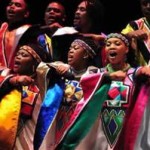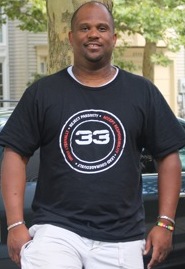I [Brian] used to think that Jesus was just for white people.
“Place your hands on the wheel.”
I had just come out of the 7-11 convenience store. I lived in Prince George’s County, a county with predominantly black residents in Maryland, but I was just across the Montgomery County line, a county with predominantly white residents.
 “License and registration!” “For what?” I replied, echoing the hostility that had been projected at me by the two white police officers that were now on either side of my car. “Are you getting smart, son?! I said, ‘license and registration!’” Now two more Montgomery County police cruisers pulled behind their comrades. They were white also.
“License and registration!” “For what?” I replied, echoing the hostility that had been projected at me by the two white police officers that were now on either side of my car. “Are you getting smart, son?! I said, ‘license and registration!’” Now two more Montgomery County police cruisers pulled behind their comrades. They were white also.
Reluctantly, I handed over my license and registration to the officer. “Why do you need my license, I just came out of the  store.” I received no reply, just a snide look and menacing grin. I seemed to fit the description and profile of the person he was after. What description and profile? The one that read: “young black male approximately six feet tall, 18-25 years old, seen in “the vicinity.’” Fitting this description produced reasonable cause to stop anyone for any crime in any county in any city in any state in the country. This was the summer of 1989. Not much has changed, except maybe the expansion of the age range.
store.” I received no reply, just a snide look and menacing grin. I seemed to fit the description and profile of the person he was after. What description and profile? The one that read: “young black male approximately six feet tall, 18-25 years old, seen in “the vicinity.’” Fitting this description produced reasonable cause to stop anyone for any crime in any county in any city in any state in the country. This was the summer of 1989. Not much has changed, except maybe the expansion of the age range.
 After several minutes (surely they called the plates into headquarters) the officer approached my window and said, “Who’s car is this?” “My father’s,” I replied. It was a 1985 528e steel blue BMW. “When I was sixteen I never drove a BMW” the officer said.
After several minutes (surely they called the plates into headquarters) the officer approached my window and said, “Who’s car is this?” “My father’s,” I replied. It was a 1985 528e steel blue BMW. “When I was sixteen I never drove a BMW” the officer said.
“Well, maybe that’s because you didn’t have my father,” I replied to the officer’s statement. “You can go” was all he said. I noticed what looked like a rosary hanging from the cruiser’s rear view mirror. I thought to myself, “This is why I won’t follow a white Jesus. Jesus is for white people.”
I thought Jesus was for white people until I read the Scriptures.
“For the LORD your God is God of gods and Lord of lords, the great, the mighty, and the awesome God,
who is not partial and takes no bribe” (Deut 10.17, Rom 2.11)
“The LORD has made known His salvation; He has revealed His righteousness in the sight of the nations.
All the ends of the earth have seen the salvation of our God” (Ps 98.2-3)
“There will be one flock, one Shepherd” (John 10.16)
“As in one body we have many members, so we, though many, are one body in Christ” (Rom 12.4-5)
“Because there is one bread, we who are many are one body, for we all partake of the one bread” (1 Co 10.17)
“There is neither Jew nor Greek, there is neither slave nor free, there is neither male nor female, for you are all one in Christ Jesus” (Gal 3.28)
 Ethnicities, classes, and genders are one in Christ.
Ethnicities, classes, and genders are one in Christ.
Oneness should glorify God. Oneness does not come from diversity but from unity.
A former student called me [Mark] one day. She was going to be married. Her desire was that I perform the ceremony. After  exchanging pleasantries and securing the date there was a long pause on the other end of the line. She questioned, “Do you think it matters if I am marrying a black man?” I laughed uproariously. “It doesn’t matter if the man is purple! You share the same beliefs and the same love for each other. That’s all that matters.” In one of the classic one-liners of all time Sarah responded, “Oh great! Now I’m going to have lavender children!” We have laughed about that over the years.
exchanging pleasantries and securing the date there was a long pause on the other end of the line. She questioned, “Do you think it matters if I am marrying a black man?” I laughed uproariously. “It doesn’t matter if the man is purple! You share the same beliefs and the same love for each other. That’s all that matters.” In one of the classic one-liners of all time Sarah responded, “Oh great! Now I’m going to have lavender children!” We have laughed about that over the years.
But Sarah was conscious that some people would focus on diversity, not unity. Do you know what matters most to Jesus?
- Not our skin color.
- Not our ethnicity.
- Not our nationality.
- Not our heritage.
- Not our culture.
- Not our biases.
 What matters most to Jesus is that we be one (John 17.11, 20-23).
What matters most to Jesus is that we be one (John 17.11, 20-23).
There is no white Jesus. There is no black Jesus. There is just Jesus.
May we in The Church find our oneness in the wholeness received from Jesus’ sacrifice on the cross. May we find joy in the oneness available through relationships across boundaries, color lines, and across the street. And may we look like Jesus’ intended us to look, in the state of oneness.
Diversity divides. But in Christ, we are all one.
Pastor Brian Green took the class “Theological Foundations of Ministry” from Dr. Mark Eckel; they have been friends ever since. Brian blogs at cellsoflife.org and his teaching can be seen athttps://www.youtube.com/user/CellsOfLife. Mark is Professor of Leadership, Education & Discipleship at Capital Seminary & Graduate School. “Oneness” is a series of three essays which focus on ethnic unity in The Church.


As always, I am never disappointed as I read the thoughts of Dr.Eckel,for I also have been taught by this gentle man of God and know how he has the ability to inspire, speaking truth without compromise. What an excellent article that the body of Christ must read! Continue blessed!
In His Strength,
Rev. B. Fontanez
Dr. Eckel,
Thanks for sharing your heart.
This is an interesting statement,”Diversity divides. But in Christ, we are all one.” Unfortunately sinners and racists do not pay attention to our theology. (not even the ones who claim to be Christians!)
I do not believe diversity is divisive. It is an opportunity to celebrate God’s diverse creative work in humanity. This was my experience when visiting Africa on four occasions. Even though I am African American, I needed to learn the diverse ethnicities and cultures of Nigerians and Kenyans. I simply could not tell myself that I was “one” with the people over there.
Rev 7:7-9, After this I looked and there before me was a great multitude that no one could count, from every nation, tribe, people and language, standing before the throne and in front of the Lamb.
I think that injustice should be addressed within the arena in which it occurs. Of course, in Christ, there is no injustice, only “Righteousness, peace and joy in the Holy Spirit.” (Rom. 14:17) After we deal with (help) people by exposing the error of their ways using Constitutional and legal means, and if they open their hearts to God, we can teach them how to believe/live better. Of course, we always pray for grace and favor in handling situations in this world.
I’m not going to quote scriptures to a racist or a person who is demeaning other people. I’m going to deal with him so that the next person will (hopefully) not have to face the same problem. I absolutely will not tolerate anyone, including a police officer, talking to me in a disrespectful or paternalistic manner because I am black. On some occasions, I’ve written letters and expressed my concerns in both mass and social media as a response, mostly on topics not related to racial injustice.
Certainly, the behavior of one person does not define the whole culture to which he belongs. So the young man’s response about the cop’s “white Jesus” was obviously an overreaction.
The biblical reality of being “one in Christ” does not change the social reality of me being a black man (large and dark-skinned as well), and being perceived and treated accordingly. Therefore, I’m not going to “soften” or deny my own ethnicity and retreat into theology as a response to racism.
De-emphasizing ones’ ethnicity and culture is really not the solution to oneness. Teaching people to embrace others, as God created them, is the answer. This is something we should do intentionally. I view this as biblical diversity.
So I would say, “Diversity educates, it does not divide. Simply saying that we are ‘one in Christ’ neither makes us one in purpose nor overcomes racism.”
Ultimately, the Body of Christ does want to aspire to theological correctness at the expense of social impotence.
Correction to last sentence:
ltimately, the Body of Christ does NOT want to aspire to theological correctness at the expense of social impotence.
Hey Brother Bryan!
Thank you for you interactions. I walk with much of what you shared and your comments are proof that we as believers need this conversation with some level of immediacy. Mark beat to the “punch” in bringing some clarification to the storied recollection that I used in this post. I would like to add that at the time I was not a believer and one of the points I was intending to bring out was that the officers actions were not in line with the Oneness we see in the Scriptures.
On and ending note, you and I will have to discuss the diversity in the spelling of the name “BRIAN” 🙂 LOL!!!
Press on Brother!
In His Will, By His Grace
Brian
Love your response here my brother! Thanks for preaching The Word, living The Word, and displaying The Word in this city and around the globe. May Christ’s Peace bring healing through the gospel, as we say together, “Even so come, Lord Jesus.”
Just to clarify, Brian Green and I wrote this series of articles together. In addition we should have been more clear: the incident Brian recorded occurred when he was a teenager, a couple of decades ago.
We stand with you to say that our theology should instruct our sociology and our sociology should demonstrate our theology.
Excellent summary, “…Our theology should instruct our sociology and our sociology should demonstrate our theology.”
Good article. It reinforces my joy in seeing our church become more racially and ethnically diverse – from marriages to the families from afar who attend and worship together here. We need more, but are thankful for what we have.
Thank you for your discussion on oneness. It is timely for me in that my son has just become engaged to a white woman. Looking at the situation from a Biblical “oneness” viewpoint gives me a Godly perspective and I can converse with his choice without gritting my teeth. Keep the good words coming. I suspect you have helped more than just me.